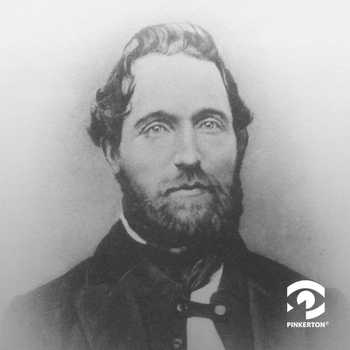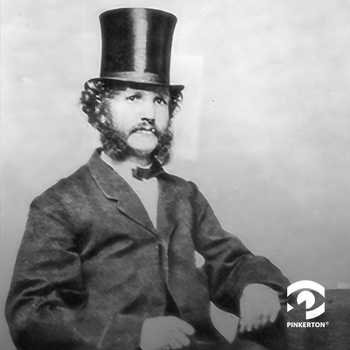Allan Pinkerton often noted that his scouts and spies were “brave, honest, and intelligent,” commenting that no danger was too great, no trust too responsible, no mission too delicate.
This was especially true of Timothy W. Webster, who was one of Pinkerton’s first operatives in the 1850s. His expertise as a detective and his distinguished reputation were firmly established long before the Civil War. However, his legacy was indelibly etched in history when he crucially intervened in the Baltimore Plot, effectively thwarting an assassination attempt on President-elect Abraham Lincoln in 1861.

As a skilled Pinkerton detective, Webster infiltrated secessionist groups in Baltimore, gathering critical information about their plans. His intelligence enabled Pinkerton to devise an alternate, secret route for Lincoln’s train journey to his inauguration, ensuring his safe arrival in Washington, D.C.
Pryce Lewis later wrote in a letter:
While sitting on the hotel verandah one day, [Samuel] Bridgeman directed my attention to a gentlemanly-looking, stalwart passer-by, who was accompanied by a lady. I observed him very closely as Bridgeman whispered, ‘That is Tim Webster, the man Pinkerton sent as a bodyguard with Lincoln when he was on his way to be inaugurated.’ I had heard much of him, but this was my first glimpse of the man whose tragic fate was to be so closely interwoven with eventful experiences of my own.

A Civil War Secret Service Scout
When the Civil War broke out, Webster was so committed to the Union cause that he joined the ranks of the Secret Service and served as a scout, going out on short-term missions to collect intelligence. Pinkerton later described Webster in Spy of the Rebellion:
…a genial, jovial, convivial spirit, with an inexhaustible fund of anecdote and amusing reminiscences, and a wonderful faculty for making everybody like him. He partook of soldiers’ fare in the rebel camp, shook hands warmly with raw recruits, joked and laughed with petty officers, became familiar with colonels and captains, and talked profoundly with brigadier generals.
Webster’s talent in sustaining a role of this kind amounted to positive genius, and it was this that forced me to admire the man as sincerely as I prized his services.
From scout to spy
Almost from the beginning of the war, Webster daringly took on the high-risk mantle of a double spy. Masterfully playing both sides, he served the South while secretly loyal to the North. His minor betrayals to the Federal government were strategic, enabling him to gain the Confederacy’s trust for a more profound deception. To the Southern man, Webster was a chameleon, adeptly adopting countless roles.
After Webster conducted several very successful short-term scouting missions to Maryland, Kentucky, Arkansas, Mississippi, and Tennessee, he was sent undercover (as a spy) with Hattie Lawton to Richmond, Virginia, where they posed as a wealthy married couple, along with Secret Service agent John Scobell, an African American man who posed as their servant.
Within five months, Webster had established himself in Richmond and was accepted there as an ardent secessionist and a Southern secret agent in the Confederate War Department under the Confederate Secretary of War, Judah P. Benjamin and Provost Marshal General Winder.
One of Webster’s duties was to convey underground mail between the South and the North — in the amount of 200-800 letters per month. He made many covert trips between Richmond and Baltimore, via Washington, where the mail was steamed opened, read, and carefully resealed for delivery to the original recipients.
Webster and Lawton sent long, detailed reports describing what was transpiring within the Confederacy war effort. They also sent reports about Richmond’s fortifications, soldier morale, and food prices. However, a severe bout of inflammatory rheumatism in 1862 left Webster incapacitated and unable to communicate with Pinkerton.
A fateful intersection of lives
In response to Webster’s condition, Pinkerton dispatched scouts Pryce Lewis and John Scully to assist him. Unfortunately, their cover was blown by a recently released Confederate spy, leading to their capture and Scully’s subsequent confession, which ultimately resulted in the arrest of Webster, Lawton, and Scobell.
Scobell was released because the Confederates could not believe a “servant” could be a spy for the North. Lawton was sentenced to one year in prison, and she was released in 1863 as part of a prisoner exchange with Belle Boyd, a well-known and often arrested Confederate spy. Webster was found guilty of espionage and was hanged on April 30, 1862, making him the first Union spy to meet such a fate.
Although he was still very weak, Webster met his fate bravely, his last words expressing a wish that “The Union might be preserved.”
No braver nor truer man died during the War of the Rebellion than Timothy Webster.
After Webster’s death, Pinkerton wrote:
He well knew, as did I, that his journey lay through a hostile country; that danger was lurking everywhere around him, and that if his true character was discovered, the consequences would, no doubt, prove fatal to him. Notwithstanding this, there was no quivering of the compact muscles, the hand that grasped mine was as firm as iron, and the brave heart that throbbed in his bosom was insensible alike to a thought of shrinking, or a desire to evade, the responsibility that devolved upon him.
After a few words of necessary caution and with good wishes for his welfare and safe return, Timothy Webster took his departure and went his way. I did not know then that I had looked upon his face and manly form for the last time, and no hint or warning of his subsequent fate came to me as I sat watching his retreating figure. But to this day, I can picture him with sentiments of pride, in his valor and services, and regrets, deep and heartfelt, for the brave man who but a few months afterward laid down his life for his country.
Continuing legacy: Pinkerton’s lifelong connection with Webster’s family
Webster was buried in the Pinkerton employees burial plot in Graceland Cemetery in Chicago. Allan Pinkerton kept in touch with Webster’s family until his death in 1884, and then his sons, William and Robert Pinkerton, who became the Eastern and Western principals of the Agency in New York and Chicago respectively, continued to correspond with and support Webster’s family.
Even in 1905, the Agency continued to financially support Webster’s widow and daughter, Sarah Robinson.
William Pinkerton wrote in a letter to Robert Pinkerton after visiting with Robinson, “They have been having hard struggle, but she has had employment right along and is the only support of her mother. Before she went away, I gave her $50.00. She hesitated about taking it but as I knew she needed it I insisted that she take it.”
This blog is a part of our Scouts and Spies series. Our founder, Allan Pinkerton, and his team of Secret Service Scouts and Spies played a critical role in gathering intelligence during the U.S. Civil War, providing a tactical advantage on the battlefield. Skilled in reconnaissance and surveillance, they navigated enemy territory, monitored enemy movements, and gathered crucial information that aided military decision-making.
Pinkerton “scouts” still play a crucial role. Organizations today rely on our research and intelligence to help shape their strategies, identify vulnerabilities, and anticipate threats, ensuring the success and safety of their operations across diverse environments. Trust in the Pinkerton legacy, and let our scouts guide your due diligence process today.
Sources:
Miller, Francis Trevelyan, and Lanier, Robert S. (Robert Sampson) (1911), The Photographic History of the Civil War, New York: Review of Reviews Co.
Pinkerton, Allan (1886) The Spy of the Rebellion: Being a True History of the Spy System of the United States Army During the Late Rebellion Revealing Many Secrets of the War Hitherto Not Made Public, G.W. Carleton.
Pinkerton, Robert, and Pinkerton, William (1905) Timothy Webster: Spy of the Rebellion, Pinkerton’s National Detective Agency, Chicago and New York.
The Chicago Times, “Samuel M. Bridgeman: Had an Eventful Life,” December 20, 1894.





